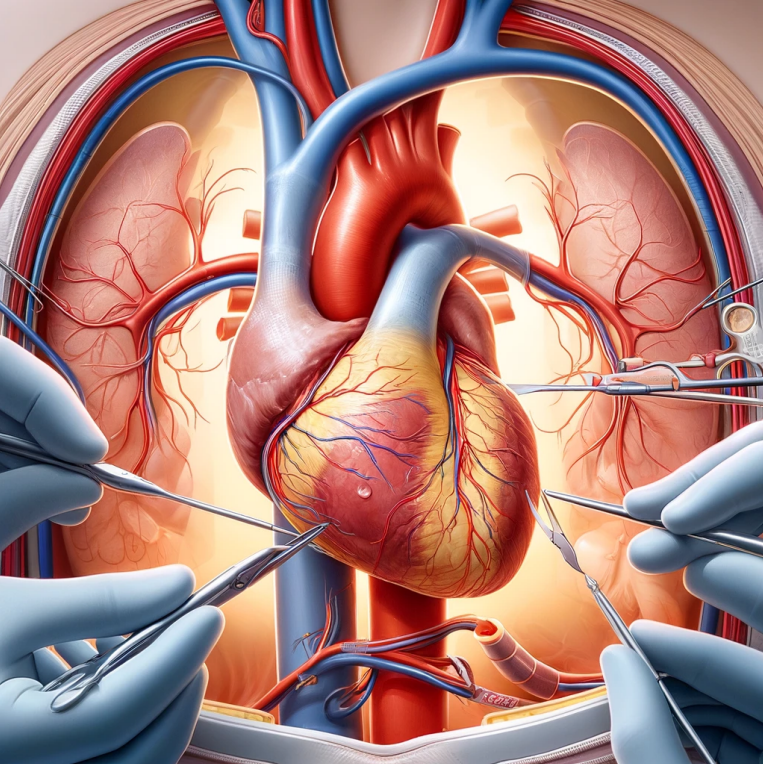The significance of having a world class heart surgery team close to home became evident to Mason City resident, Kevin Scharper, a retired social worker who underwent triple bypass surgery due to coronary artery disease (CAD).
In this article, we will explore CAD in depth. Our aim is not only to provide insight into Kevin’s story, but also to empower you to recognize warning signs and make informed decisions about your health and well-being.
Coronary artery disease (CAD) is a progressive condition that inhibits the flow of blood to the heart. Though there may be multiple causes, the disease is typically characterized by the buildup of plaque within the arteries that supply blood to the heart muscle. This accumulation of fatty deposits, cholesterol, and other substances narrows the arteries, restricting blood flow and oxygen delivery to the heart.
Coronary artery disease silently progresses, often detected only when symptoms surface. Symptoms can include chest pain (angina), shortness of breath, fatigue, and in severe cases, heart attack or heart failure. Recognizing the risk factors for CAD, such as high blood pressure, high cholesterol, smoking, diabetes, and sedentary lifestyle, is crucial for prevention and early intervention.
Symptoms of coronary artery disease can vary but may include chest discomfort or pressure (angina), shortness of breath, nausea, abdominal discomfort, and pain in the neck, jaw, throat, or back. Kevin experienced fatigue, shoulder heaviness, and jaw pain. These warning signs prompted him to seek medical attention promptly, leading to a series of diagnostic tests, including an angiogram.
While men tend to develop CAD at a younger age, women typically experience CAD later in life, often after menopause. Additionally, women may have different patterns of plaque buildup in their arteries, making diagnosis and treatment more challenging. Moreover, women may present with less typical symptoms of CAD, which can be mistakenly attributed to other conditions.
Several risk factors increase the likelihood of developing coronary artery disease, including age, family history, high blood pressure, high cholesterol levels, diabetes, smoking, obesity, sedentary lifestyle, and mental stress.
Treating CAD involves lifestyle modifications and a range of therapies to ease symptoms, boost heart health, and lower risks.
Lifestyle modifications, including regular exercise, healthy diet, smoking cessation, and stress management, form the cornerstone of CAD prevention and management. Additionally, medications such as statins, blood thinners, and antiplatelet agents may be prescribed to control risk factors and prevent further progression of the disease.

When lifestyle changes and medications are insufficient to manage coronary artery disease, heart surgery may be necessary.
In the video, Kevin says he expected to have additional stent placement, but after careful consideration of his age, health status, and unique circumstances, his physician recommended coronary bypass surgery.
Percutaneous coronary intervention (PCI), often referred to as angioplasty, involves inserting a stent into narrowed arteries to restore proper blood flow. While PCI can yield positive outcomes for select patients, others may require a more comprehensive solution due to the complexity of their condition.
Coronary bypass surgery, also known as coronary artery bypass grafting (CABG), is a surgical procedure that entails bypassing obstructed coronary arteries using healthy blood vessels sourced from other parts of the body. This allows for the restoration of adequate blood flow to the heart muscle, reducing symptoms and improving overall heart function.
The decision to pursue CABG is a nuanced one, influenced by various factors including the patient’s overall health, disease severity, and personal preferences. For individuals like Kevin, whose CAD warranted more aggressive intervention, CABG can provide a pathway to enhanced quality of life and long-term cardiac health.
The decision to undergo cardiac surgery, whether PCI or CABG, involves careful consideration of individual patient factors, including overall health, age, extent of disease, and personal preferences. In Kevin’s case, the expertise and guidance of his cardiac surgeon, Dr. Del Rio, were instrumental in shaping his treatment plan and instilling confidence in the chosen approach.
Informed decision-making hinges on open communication, thorough understanding of treatment options, and alignment with personal values and goals. Patients are encouraged to engage in open communication with their healthcare providers, ask questions, and explore all available treatment options before making an informed decision. For individuals facing CAD, this collaborative approach fosters a sense of agency and control, paving the way for optimal outcomes and improved quality of life.
Mason City Clinic‘s multidisciplinary team of cardiologists, cardiothoracic surgeons, and vascular surgeons provide world class care at MercyOne North Iowa Heart Center, a state-of-the-art facility in Mason City. For individuals like Kevin, having access to top-notch healthcare close to home can make all the difference in their treatment and recovery.
To book an appointment, please call 641.494.5300 or ask your primary care physician for a referral. With expert care and informed decision-making, individuals like Kevin can navigate CAD with confidence and improve their quality of life.
Up-to-date. Down-to-earth. Close to home. Lots of great reasons to make Mason City Clinic
your first choice for all your family’s specialty healthcare needs.
250 S. Crescent Drive, Mason City, IA 50401
Tel: 641.494.5200
Toll Free: 800-622-1411
Fax: 641.494.5403